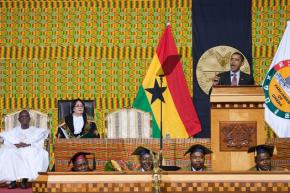Obama’s message in Ghana
reports from Ghana on the visit of Barack Obama--and the response of ordinary Ghanaians.
PRESIDENT BARACK Obama said Africa's future "is up to Africa" in a speech to Ghana's parliament July 11, but he ignored the U.S. government's own role in increasing poverty in the West African nation.
Ghana owes the equivalent of more than half its total annual economic output to American lenders, including the International Monetary Fund and World Bank. That level of debt makes large-scale investments in development projects impossible.
Nearly 30 percent of the population lives on less than $1 a day, unemployment is estimated to be as high as 25 percent, and most Ghanaians are forced to leave school after 10 years of primary education on average to help provide for their family.
Despite the pomp and circumstance outside as Obama spoke in Accra's convention center--a small building that prevented all but a privileged few from seeing him--many of Accra's residents have no illusions about the president helping them.
"He is just giving money to [Ghanaian] President [John Atta Mills]," said Paul Kofi, a 22-year-old who sells plastic necklaces in Accra's Osu shopping market. "Then [Mills] will give it to his whole group, ministers, the wife, etc."

Kofi lives on about $6-7 a day, rents a small room north of Accra with no air conditioning (the average temperature in Accra is 86 degrees), and never finished high school. "I want to talk to [Obama]," said Kofi. "But he won't see me."
Kofi's situation isn't unique. Accra is jammed with "street kids," as they refer to themselves, desperate for tourists to buy cheap goods and anything else they can sell.
Akeem Yebua makes about $6 a day selling acrylic paintings in Osu. The 25-year-old has his own interpretation of Obama's campaign slogan: "Actually, he'll bring change...but for the leaders," he said.
Yebua also doesn't have much hope for the Ghanaian government. "[Mills] is a good president, but the people around him are bad," he said. "They don't have the eyes to see the people in back."
President Mills has been in power for five months, and his choice of residence, the same as his predecessors, doesn't bode well for working-class Ghanaians. He currently lives in Osu Castle--the same place from which Ghana's colonial occupiers, the British, governed until 52 years ago, and where slaves were once kept. Plans were originally set in 2008 for Ghanaian presidents to live in a new "presidential palace" in Accra, but Mills' party won't pay for it.
In his speech, Obama criticized health care in Ghana, saying that "too many people are still dying of diseases," but Ghana is a country with socialized medicine, unlike the U.S. In fact, Ghana ranks a step above the U.S. by several measures: It spends more on education as a percentage of GDP than the U.S., and it ranks higher than the U.S. in Reporters Without Borders' Worldwide Press Freedom Index.
Large billboards with pictures of Obama and Mills, with the phrase "Partnership for Change," dominated the landscape in Accra leading up to the speech. Ghana's president spoke before Obama, saying that six months earlier, both countries had "voted for change."
"If [Mills] wants change, he needs to start putting money into projects," said 23-year-old student Mawutor Kudoto of Accra. "This happens time and time again. They say they will bring money into the country, then you don't see the projects."
Kudoto does think it is "cool" that Obama is visiting, but wants to see independent development. "We don't need to be dependent on others, like the IMF and World Bank," he said. "Ghanaians need to take care of their own affairs."


